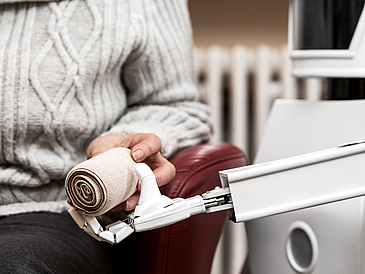Globally, AI methods are not only being implemented in medicine but increasingly in nursing. For example, when shifts and staff need to be distributed and deployed efficiently, it is possible to provide support by means of machine learning. Thanks to image and signal processing, potential falls or ones that have already happened can be determined, as can changes in the mobility of aged people and those in need of care. Another possibility is to support decision-making in day-to-day care situations with expert systems that simulate the reasoning of a human expert. Implementation examples could include the choosing of a suitable wound covering or an individually suitable exercise for movement support.
Challenges for Research in Day-to-Day Care
The new technology creates many opportunities. However, researchers and developers often face one particular challenge in the area of AI and care: In order to develop needs-based AI solutions for nursing, care facilities and agents from the care sector need to partake in research projects and work together successfully. Additionally, alongside limited staff and financial resources in the care sector, digitalization has only been advanced to a lesser extent.
How Can AI Work in Nursing? An Accompanying Study from the University of Bremen Has Begun
“Nursing staff and researchers have found that when the two disciplines nursing and computer science meet, there is often a balancing act required between the demands of day-to-day care and those of science,” says Professor Karin Wolf-Ostermann, nursing researcher at the Institute of Public Health and Nursing Research (IPP), University of Bremen.
The scientific accompanying program that has started now aims to improve this situation. The study entitled “Process Development and Accompaniment of AI Implementation in Nursing” (“Prozessentwicklung und -begleitung zum KI-Einsatz in der Pflege”) advises and connects research projects that have the goal of supporting carers and relatives who provide care, as well as improving the autonomy and life quality of persons in need of care. The Federal Ministry of Education and Research will provide funding from March 2022.
Additionally, the Bremen researcher’s project creates structures for knowledge and data exchange between the various research projects concerning AI in nursing, for example by means of an online platform. The researchers can also make use of coaching and consultation sessions on nursing aspects, AI methods, and project management. “In this way, we want to especially support AI research projects that are developing solutions for the first time or have only recently begun to do so in successfully working together with agents from the field of practical care,” explains Professor Karin Wolf-Ostermann. Moreover, the project is investigating various issues. These include the care-based use of AI solutions or the representativeness of data - with consideration of how people with cognitive impairments or special care needs are represented within the data. Ethical aspects of AI in nursing are also being looked at.
In order to handle this topic in an interdisciplinary manner, the following institutes are working together: Institute of Public Health and Nursing Research (IPP) and the Institute of Philosophy at the University of Bremen, Institute of Medical Informatics of the Charité – Universitätsmedizin Berlin, Berliner Hochschule für Technik (BHT), Alexander von Humboldt-Institute for Internet and Society, and Verband für Digitalisierung in der Sozialwirtschaft e.V.
Further Information:
https://www.public-health.uni-bremen.de/departments/health-care-research/
http://www.healthsciences.uni-bremen.de/en/home.html
Contact:
Prof. Dr. Karin Wolf-Ostermann
Department of Nursing Science Research
Institute of Public Health and Nursing Research (IPP)
Faculty of Human and Health Sciences
University of Bremen
Phone: +49 421 218-68960
Email: wolf-ostermannprotect me ?!uni-bremenprotect me ?!.de
Kathrin Seibert and Dominik Domhoff
Research Assistants
Institute of Public Health and Nursing Research (IPP)
University of Bremen
Phone: +49 421 218-68903
Email: prokipprotect me ?!uni-bremenprotect me ?!.de

